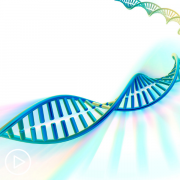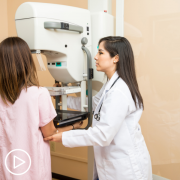What Is a Breast Cancer Genetic Mutation?
What Is a Breast Cancer Genetic Mutation? from Patient Empowerment Network on Vimeo.
Breast cancer patients may learn that they have a “genetic mutation”—so what does that mean exactly? Dr. Jame Abraham defines the term and explains what mutation status could reveal about a patient’s individual disease.
Dr. Jame Abraham is the chairman of the Department of Hematology & Medical Oncology at Cleveland Clinic and professor of medicine at Cleveland Clinic Lerner College of Medicine. Learn more about Dr. Abraham.
See More From INSIST! Breast Cancer
Related Resources:

What Do You Need to Know About Breast Cancer Genetic Testing? |
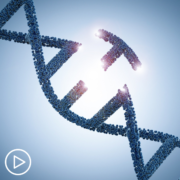
What’s the Difference Between Germline and Somatic Breast Cancer Mutations? |
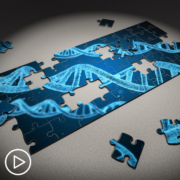
|
Transcript:
Dr. Abraham:
So, genetic mutation is, the change is happening within the tumor, which is making it more aggressive, or less aggressive. So, what’s driving this tumor? Let us think, it’s like a machine, and the machine has, probably, different parts, and we know, every part plays a role in driving that engine, but some part may be playing a major role in driving that engine, and the question is, can we knock that off with certain medicine?
So, select genetic testing. If the tumor has, what we call, it’s an ESR1 mutation, then we can use some medicine, which can block that ESR1. That’s a new drug, which just got approved recently, to see if they have some kind of an immune marker, what we call as, a PD-L1 marker. Then, it can be used like an immunotherapy, to stop that cell growth. So, let’s just say, if I have somebody with BRCA1 somatic mutation, in some patients, even certain medicines, like PARP inhibitors, may be helpful. So, identifying that, what’s turning them on, and trying to identify a medicine which can turn that off.
What’s the Difference Between Germline and Somatic Breast Cancer Mutations?
What’s the Difference Between Germline and Somatic Breast Cancer Mutations? from Patient Empowerment Network on Vimeo.
Breast cancer expert Dr. Jame Abraham reviews the key differences between germline and somatic genomic testing and explains the role they play in treatment, care, and predicting a recurrence.
Dr. Jame Abraham is the chairman of the Department of Hematology & Medical Oncology at Cleveland Clinic and professor of medicine at Cleveland Clinic Lerner College of Medicine. Learn more about Dr. Abraham.
See More From INSIST! Metastatic Breast Cancer
Related Resources:

What Do You Need to Know About Breast Cancer Genetic Testing? |

|

|
Transcript:
Katherine:
Dr. Abraham, what’s the difference between germline and somatic genetic mutations?
Dr. Abraham:
Sure. So, germline, as I said, to see if we carry that gene, and it means, I’m born with that. I’m inherited. I carry that gene. That’s in my DNA. Somatic is, the change is happening within the tumor, within the tumor.
So, it’s kind of – sometimes, it can be acquired. So, let’s just say, if I’m seeing a patient with breast cancer, and then, it can be early stage. So, I’ll kind of say that – let’s just say, if I’m seeing somebody with a stage II breast cancer, we can do a genomic testing of the tumor to identify the risk of recurrence for the next nine years or so. We do that, mainly in what we call as ER-positive, HER2-negative tumors. So, hormone-positive, HER2-negative tumors.
In early-stage setting, we do genomic testing to classify the risk of recurrence. And I found the high risk, or low risk, that’s one. And second, this genomic testing will tell us the benefit from chemotherapy.
So, share prognosis, and treatment decision.
So, the other genomic testing we commonly do is, let’s just say, she has seen somebody who is metastatic, means the cancer already spread to other part of the body. Again, we can do the genomic testing from the tumor, and then, that’ll kind of give us what, the changes happening within the tumor. That’ll help us to identify potential, and what particular targets within the tumor, so that we can treat them with new treatments, or screen them for clinical trials.
And then, some of the new treatments have specific mutations that’ll identify if patients benefit from certain medications. So, the genomic testing will help us to select patients for these new treatments, or even clinical trials.
What Is Breast Cancer Genomic Testing?
What Is Breast Cancer Genomic Testing? from Patient Empowerment Network on Vimeo.
What do results of breast cancer genomic testing reveal? Expert Dr. Jame Abraham explains this type of testing and common breast cancer genetic mutations and discusses how tests are typically administered.
Dr. Jame Abraham is the chairman of the Department of Hematology & Medical Oncology at Cleveland Clinic and professor of medicine at Cleveland Clinic Lerner College of Medicine. Learn more about Dr. Abraham.
See More From INSIST! Metastatic Breast Cancer
Related Resources:

What Do You Need to Know About Breast Cancer Genetic Testing? |

|
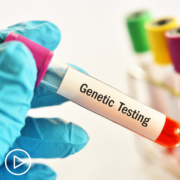
|
Transcript:
Katherine:
Dr. Abraham, for breast cancer patients who don’t understand the term, what is genomic testing?
Dr. Abraham:
So, genomic testing, there are two types of genomic testing, what we call as, germline testing. And then, there’s another one, what we call as, somatic testing. So, germline testing means, the question is, if I carry a gene which can make me high risk for breast cancer. So, one of the most common questions I get from our patients when I see them is, “Oh, do I carry a gene? Why did I get this breast cancer?” And then, the other question is, “What’s the risk for my kids, my daughter?”
So, I’ve seen, about 5 to 10 percent of breast cancers are due to an abnormal gene. To find that, we do, what we call as, the germline testing. That’s the first – when we say genomic testing, that’s the most commonly understood nomenclature.
So, do I carry this gene? It’s a blood test, or we can take a mouth swab. That will give us an answer, if that person carries a gene.
Usually, we test several genes, and I’m sure, most of the people have BRCA1, BRCA2, PALB2, CDH1. Those are some of the genes we test, and BRCA1 and BRCA2 are the most common, and 80 percent of heredity, or those who are transmitted to the next generation, is attributed to BRCA1 and BRCA2.
Katherine:
How is this testing administered?
Dr. Abraham:
So, it’s a blood test.
Most of the time, we can draw – usually, the way we do is, I like to say, if I’m seeing a patient who has – and this is a patient who’s 45 years old and has a strong family history, or in patients under the age of 50, with a triple-negative breast cancer, or any person under the age of 50, can be considered for genetic counseling. And then, based upon the conversation with a genetic counselor, we will recommend the genetic testing. Usually, it’s a blood draw.
How Do Biomarker Test Results Impact a Breast Cancer Patient’s Prognosis?
How Do Biomarker Test Results Impact a Breast Cancer Patient’s Prognosis? from Patient Empowerment Network on Vimeo.
What role do biomarker test results play in a breast cancer patient’s prognosis? Dr. Bhuvaneswari Ramaswamy reviews important biomarkers, such as hormone receptor status, and how they affect care.
See More From INSIST! Metastatic Breast Cancer
Related Resources:

What Do You Need to Know About Breast Cancer Genetic Testing? |

|
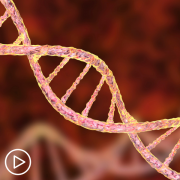
How Do Genetic Mutations Impact Breast Cancer Risk, Prognosis, and Treatment? |
Transcript:
Katherine:
How do biomarker test results impact prognosis?
Dr. Ramaswamy:
All of them do because it’s important to understand that that’s why this – these biomarkers carry a lot of weight. Biomarkers are good, are important, but when the most important biomarkers are that are going to impact outcomes. And then even more important is whether they’re going to predict the efficacy of a treatment, the outcomes used by the success of a treatment, right?
So, in that way, if your tumor is estrogen and progesterone receptor- positive, then you generally tend to do a little bit better. And they are slightly better tumors for sure, and you know that the anti-estrogens would work. So, these – there’s two ways. They are prognostic and predictive. Now, the whole two positive tumors previously used to have a worse prognosis, but we have such wonderful anti HER2 therapies now that we can use. Now we know that if you use those therapies, the outcomes are better.
So, it’s predictive again, that predictive of the treatment and prognostic. Now the triple negatives are usually a little bit more difficult to treat because as you can understand, they don’t have any of these targets for us to use targeted therapy at this point. There is definitely some improved outcomes using immunotherapy, but you know that we don’t have those proteins. So, slightly worse outcomes for sure, triple negative among all of these subtypes. And also there is no biomarkers.
We do use immunotherapy, which is helping certain percentage of those patients, but we still need to understand why it’s not helping other people. So, yeah.
Genetic Testing VS Biomarker Testing: What’s the Difference?
Genetic Testing VS Biomarker Testing: What’s the Difference? from Patient Empowerment Network on Vimeo.
See More From INSIST! Metastatic Breast Cancer
Related Resources:

What Do You Need to Know About Breast Cancer Genetic Testing? |

|

|
Transcript:
Katherine:
Patients are often confused about the difference between hereditary genetic testing and biomarker testing. Would you explain the difference?
Dr. Ramaswamy:
Absolutely. So, the hereditary genetic testing is what are the genes that you got from your parents? It could be mother or father. And we all think that because it’s breast cancer should be just from mother. It doesn’t matter. It can be from mom or dad. And that influences your breast cancer risk. So, if you have some mutations or some changes in certain genes that can increase your risk of breast cancer. And the well-known ones are the BRCA1, BRCA2, but we also now know a few more like the PALB, ATM and CHEK2 and other things.
So, now when you do have a family history, or sometimes even based on your age and your oral history, we do test for this hereditary risk factors that you might have and that may influence your surgery and some type of treatments that we give as well.
Now as far as biomarkers, biomarkers are more proteins that we check in your tumors. The breast cancer that you already have, and that we may do the biopsies. We look for these tumor proteins that influences the growth of your cancer cells. So, we can target these biomarkers and decrease the growth of your cancer cells.
What Do You Need to Know About Metastatic Breast Cancer Genetic Testing?
What Do You Need to Know About Metastatic Breast Cancer Genetic Testing? from Patient Empowerment Network on Vimeo.
Why is it important to ask about metastatic breast cancer genetic testing? Find out how test results could reveal more about YOUR breast cancer and could help determine the most effective treatment approach.
See More From INSIST! Metastatic Breast Cancer
Related Resources:
Transcript:
Why should you ask your doctor about metastatic breast cancer genetic testing?
The National Comprehensive Cancer Network – also known as the NCCN – recommends that every metastatic breast cancer patient undergo genetic testing. The test results can help predict how your cancer may behave and could indicate that one type of treatment is more effective than another.
This testing identifies specific gene mutations, proteins, chromosomal abnormalities, and/or other molecular changes that are unique to YOU and YOUR breast cancer.
There are two main types of genetic tests used in breast cancer:
- Germline or hereditary genetic testing, which identifies inherited gene mutations in the body. These mutations are present from birth, can be shared among family members and be passed on to subsequent generations.
- The second is somatic or tumor genetic testing, which identifies markers that are unique to the cancer itself. It is also commonly referred to as genomic testing, biomarker testing, or molecular profiling. Somatic mutations are NOT inherited or passed down from family member to family member.
- Depending on your history, your doctor may order one–or both–of these types of tests.
So why do the test results matter?
- If you have specific gene mutations – such as the BRCA1 or BRCA2 inherited gene mutations – it could indicate that a targeted treatment approach may be the most effective option. For example, there are two oral targeted therapies that are approved specifically for use in metastatic patients with BRCA1-positive or BRCA2-positive breast cancer.
- Results of these tests may also help you to find a clinical trial that may be appropriate for your particular cancer.
- Additionally, results from germline genetic testing may suggest that close family members should also be tested to determine their risk.
How can you insist on the best breast cancer care?
- First, always speak up and ask questions. Remember, you have a voice in YOUR breast cancer care.
- Ask your doctor if you have had–or will receive–genetic testing, including germline and somatic testing.
- If you have already undergone genetic testing, bring a copy of your results to your current doctor, so they can understand your results and determine whether additional testing is needed.
- Have a discussion with your healthcare team about the test results – including which markers were detected and how results may impact your care and treatment plan.
- Ask whether your family members should meet with a genetic counselor or undergo testing to help gauge their risk of developing breast cancer.
- And, finally, bring a friend or a loved one to your appointments to help you process and recall information.
To learn more about breast cancer and to access tools for self-advocacy, visit powerfulpatients.org/breastcancer.
What Do Metastatic Breast Cancer Patients Need to Know About Genetic Testing?
What Do Metastatic Breast Cancer Patients Need to Know About Genetic Testing? from Patient Empowerment Network on Vimeo.
What do metastatic breast cancer patients need to learn about genetic testing? Expert Dr. Sarah Sammons explains the difference between germline testing versus somatic testing and defines key terms, including biomarker testing and genetic mutations.
Dr. Sarah Sammons is an oncologist at Duke Cancer Institute and Assistant Professor of Medicine at Duke University School of Medicine. Learn more about Dr. Sammons here.
See More From INSIST! Metastatic Breast Cancer
Related Resources:

|

Essential Testing Following a Metastatic Breast Cancer Diagnosis |

How Do Genetic Mutations Impact Breast Cancer Risk, Prognosis and Treatment? |
Transcript:
Katherine:
Many patients are confused by genetic testing. Let’s look at the difference between germline and somatic testing.
Dr. Sammons:
Yes, that’s a really good question and one that comes up in the clinic quite frequently. When I tell a patient that I want to get some sort of genetic testing, they often are confused, and say, “Well, I’ve already had genetic testing, maybe when I was first diagnosed with early-stage breast cancer.” And so then, I do often times need to explain what the difference between germline and somatic genetic testing is.
So, germline testing is testing that’s done on cells in your body that actually don’t have cancer. And the purpose of germline testing, which we often do in early-state breast cancer or in metastatic breast cancer, is to understand if you have inherited genes that could pre-dispose you to developing breast cancer. But also, in the metastatic setting, it’s important to do germline testing because we do have drugs that are approved for patients that have germline mutations in the BRCA genes. And research is evolving, but there are other germline genes of interest that could be biomarkers for other therapies.
Somatic testing is basically genetic testing on the breast cancer cells themselves. So, most often we will get a biopsy, usually of a metastatic area, like the liver, or bone, or lung. Really the safest, most accessible place. If we’re able to safely get a biopsy, oftentimes we’ll send somatic testing – that’s also referred to as usually next generation sequencing – is all somatic testing. And that tests mutations that have developed in the breast cancer itself. It could potentially be biomarkers for optimizing and tailoring personalized treatment approaches to the patient’s cancer.
Katherine:
I’d like to define a few terms. First of all, what is biomarker testing?
Dr. Sammons:
That’s a really good question. So, a biomarker is really anything – it could be a gene; it could be a protein – that is expressed on a patient’s cancer, that makes them a good candidate for a certain drug, essentially.
So, one of the earliest biomarkers that we’ve had in breast cancer – and still, I would argue, the most important biomarkers – are estrogen receptor and HER2.
Now, we test all breast cancers for estrogen receptor and HER2 because we know for estrogen receptor – if a patient has estrogen receptor high positivity at their initial diagnosis, that is the best biomarker for endocrine therapies, whereas HER2 present on a breast cancer cell – patients that overexpress HER2, they are great candidates for drugs that specifically target HER2.
So, it simply means that we found something on their breast cancer cell that makes them a good candidate for a treatment.
Katherine:
What is a genetic mutation?
Dr. Sammons:
So, genetic mutations are a permanent change in the DNA of a gene, in either a cancer cell or a cell that somebody was born with. So, it’s a change in the DNA sequence. And some gene mutations drive cancers to grow. Some mutations do not drive cancers to grow. Generally, in the treatment of all advanced cancers, we only target with drugs those gene mutations that we know are what we call “driver mutations.” So, mutations that actually cause the cancer to grow.
How Can You Ensure You’ve Had Essential Metastatic Breast Cancer Testing?
How Can You Ensure You’ve Had Essential Metastatic Breast Cancer Testing? from Patient Empowerment Network on Vimeo.
How can metastatic breast cancer patient ensure they receive essential testing? Dr. Jane Lowe Meisel explains how tests can vary by patient and shares advice for key questions to ask to help ensure optimal care.
Jane Lowe Meisel, MD is an Associate Professor of Hematology and Medical Oncology at Winship Cancer Institute at Emory University. Learn more about Dr. Meisel here.
See More From INSIST! Metastatic Breast Cancer
Related Resources:
Transcript:
Katherine:
We’ve talked about several key tests. Some patients may be confused about whether they’ve received these tests. So, what questions should they ask their physician to make sure they’re getting appropriate testing?
Dr. Meisel:
I think it’s probably useful because not everybody needs every test, and I think there are often things you hear about online or from friends or even in a webinar like this and there may be a good reason why you haven’t had that particular test. So, I wouldn’t assume that if you haven’t had everything that we’ve talked about today even, that someone’s made a mistake or that you need that and aren’t getting it. But I would ask. I think it’s always helpful to know more, knowledge is power. And so, if you have never had a CT scan or a CA27-29 level or a genomic testing.
I think it’s not a bad thing if you’re curious about it, to just ask your treating team, “Hey, I heard about genomic testing, is there a reason I haven’t had that? Or have I had that?” Maybe you have, and they called it something else. I think it is complicated, but I think it helps to understand what you’ve had done and what you haven’t had done. And sometimes, asking about something like that may prompt the team to do things that my benefit you.
How Does Biomarker Testing Impact Metastatic Breast Cancer Treatment Options?
How Does Biomarker Testing Impact Metastatic Breast Cancer Treatment Options? from Patient Empowerment Network on Vimeo.
How are metastatic breast cancer treatment options impacted by biomarker testing results? Dr. Jane Lowe Meisel explains germline testing versus somatic testing – and how results may be used to help determine optimal treatment.
Jane Lowe Meisel, MD is an Associate Professor of Hematology and Medical Oncology at Winship Cancer Institute at Emory University. Learn more about Dr. Meisel here.
See More From INSIST! Metastatic Breast Cancer
Related Resources:

Essential Testing Following a Metastatic Breast Cancer Diagnosis |

|
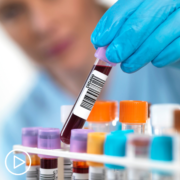
What Could Metastatic Breast Cancer Genetic Testing Advances Mean for You? |
Transcript:
Katherine:
What is biomarker testing, and how do results impact treatment options?
Dr. Meisel:
Great question. So, I think people often confuse germline mutations and somatic mutations. So, I’ll talk about that a little bit as we talk ab out biomarkers. So, I think biomarkers in general are factors within the tumor that allow us to make treatment decisions. So, if a biomarker in the tumor can predict response to a certain type off treatment, we want to know what that biomarker is so we can better treat the patient and more elegantly design a regimen. So, for example, having an estrogen-positive tumor, estrogen positivity is a biomarker suggestive of response to anti-estrogen treatments, which is why we give anti-estrogen therapy to ER-positive breast cancers.
But more recently, we’ve been able to move a little bit beyond estrogen, HER2 and triple-negative as our subtypes and think a little bit more in some patients about more sophisticated biomarkers. And that’s where somatic mutation testing comes in. So, there are germline mutations, which are inherited mutations that’re present in every cell in your body. So, for example, if your mother was a BRCA mutation carrier and based that BRCA mutation down to you, you would have a germline BRCA mutation. So, your cancer would carry a BRCA mutation, but so would every other cell you have.
And that’s a biomarker. That would make you a candidate for something like a PARP inhibitor. But in cancers, which the genes in the cancer have gone awry by definition, there are often other biomarkers within that tumor that may make you a candidate for certain treatments. And so, those mutations that arise in the cancer itself are called, somatic mutations. Those are mutations in the tumor, can’t be passed down to your offspring or anything like that and were not inherited by your parents. But mutations that’ve accumulated over time as these cancer cells have gone awry.
And so, genomic testing, or biomarker testing can be done often on a metastatic specimen. So, to be specific about it, say you had a metastatic breast cancer to the liver. You could have a liver biopsy done and that tissue from the liver biopsy could be sent for genomic testing. There are a lot of companies that do this and there are also some larger cancer centers that actually do in house testing for genomics. So, this testing can be done and what it does then is, it helps you determine, do you have a biomarker that predisposes you to a certain treatment.
So, if that metastatic liver tissues, for example contained high levels of PBL1 expression for example and you were triple-negative, that would say to your doctor ooh, this is a great candidate for immunotherapy along with chemotherapy. Or if you’re estrogen-positive for example and your tumor contains a mutation in the gene called PIK3CA and that might make you a candidate for a drug called, Alpelisib. So, these mutations could often be paired to a drug or treatment options, or sometimes to a clinical trial to allow patients to come take advantage of more targeted therapies. That sometimes, because they’re targeted, have fewer side effects than drugs that are a little more discriminate.
Katherine:
Marie sent in this question prior to the program, “Are there some genetic tests that’re more accurate than others?”
Dr. Meisel:
That’s a good question. I would say most genetic testing platforms have been heavily vetted and approved by national organizations and laboratories that’ve been tested multiple times before they’re allowed to be marketed. So, I wouldn’t say that one genetic testing program is necessarily better than another. I think that any of the commercially available platforms that’re used are probably pretty accurate.
I was just going to add one thing to that, if that’s okay. I was going to say that I think it’s important when you’re using genetic testing platforms though to know what you’re testing for. So, there are some platforms that will just test for say, the three most common mutations in BRCA1 and BRCA2 that Ashkenazi Jews have.
And so, if you get that testing back and you’re negative, you might think, “Oh, I don’t have a mutation in those genes.” Well, we know from that testing, just as an example, is that you don’t have a mutation in those three alleles of that gene. But if you haven’t had full gene sequencing, you could have a mutation somewhere else in that gene. So, I would say all genetic testing that’s commercially available is probably pretty accurate. But it is important when you get testing done to know what you’re testing for and what you’re not testing for so you can interpret your results accurately. And genetic counselors, as well as your doctors can help you do that.
What Are Essential Genetic Tests for Metastatic Breast Cancer Patients?
Following a metastatic breast cancer diagnosis, what tests are essential? In this podcast, Dr. Lisa Flaum reviews the role of key tests, and the impact of molecular (genetic) test results on treatment decisions.
About the Guest:
Dr. Lisa Flaum is a Medical Oncologist at the Robert H. Lurie Comprehensive Cancer Center of Northwestern University.
Genetic Testing: How do Results Impact Metastatic Breast Cancer Care?
In this podcast, breast cancer expert Dr. Erin Roesch explains how genetic testing results could impact metastatic breast cancer care–including treatment options–and provides advice for self-advocacy.
Dr. Erin Roesch is a breast medical oncologist at Cleveland Clinic. More about this expert here.
Transcript:
Katherine:
Welcome to Empowered, a podcast by the Patient Empowerment Network. I’m your host, Katherine Banwell.
Today, we’re talking about the role of genetic testing in metastatic breast cancer care—how results can impact treatment options and decisions. We’ll also discuss new and emerging treatment options.
Joining us Dr. Eric Roesch. Dr. Roesch, could you please introduce yourself?
Dr. Roesch:
Sure. So, my name is Dr. Eric Roesch. I am one of the breast medical oncologists at Cleveland Clinic.
Katherine:
Thank you. And let’s just start with the basics. So, what is metastatic breast cancer?
Dr. Roesch:
Metastatic breast cancer refers to a cancer that began in the breast and then has spread to involve other parts of the body. Although metastatic breast cancer is likely uncurable, meaningful advances have been made in treatment over the last several years. The primary goals of treatment are to improve survival, as well as quality of life and symptoms.
Katherine:
Dr. Roesch, when patients are first diagnosed with Metastatic breast cancer, are there misunderstanding that they have and what are some of them?
Dr. Roesch:
I think a common misconception that I hear when patients are first diagnosed with metastatic breast cancer, is the availability of treatment options. At the initial clinic visit, I really strive to make sure patients understand that although metastatic breast cancer is unlikely curable, it is very treatable. And we have a lot of therapies, especially that have been approved in recent years, that can help patients live better and longer lives.
Katherine:
That’s really encouraging.
As I mentioned, we’re going to talk about genetic testing, also known as molecular testing.
So, what is genetic testing exactly?
Dr. Roesch:
Genetic testing refers to any type of testing that can help determine an individual’s genotype. Which is essentially, the DNA makeup, or DNA blueprint, that is associated with clinical manifestations of a certain disease or a specific trait. A phenotype, rather. Genetic testing can be determined for a germline, which refers to cells arising from the germ cells, which are applicable the vast majority of the body.
Or they can be selected for somatic cells, such as those found within tumors. Genetic testing can be helpful for metastatic breast cancer, as there are various drug therapies that are approved for patients found to have specific mutations. For example, if a woman is found to have a BRCA1 or 2 mutation, she may be a candidate for a medication called a PARP-Inhibitor.
Olaparib and talazoparib are both PARP-Inhibitors that are approved for patients with germline BRCA mutations and HER2 negative metastatic breast cancer.
Dr. Roesch:
Genetic testing is administered in a couple of different ways. So, first it can be performed on blood or saliva containing cheek cells, essentially.
Testing on tumor tissue can also be used to identify additional acquired or somatic genetic changes.
Katherine:
You mentioned HER2, what is that?
Dr. Roesch:
HER2 is a protein that’s expressed on many other cells throughout the body.
Some breast cancers are driven by, or over express this protein. And that can be helpful to identify patients that might benefit from HER2 targeted therapy.
Katherine:
And what about BRCA1 and BRCA2, what are they?
Dr. Roesch:
BRCA1 and BRCA2 are proteins that are involved in DNA repair in the body. And any time one of these mutations is defective, there is an error in DNA repair.
Katherine:
So, as I understand it, genetic testing can lead to more targeted or personalized treatment. How has targeted therapy changed the landscape in treatment?
Dr. Roesch:
Targeted therapy has definitely had an impact on metastatic breast cancer treatment. There are various therapies that are now approved for patients with a certain breast cancer subtype. As well as for those with specific mutations or protein over-expression. Some examples of these include, CDK4/6 inhibitors, BRCA mutations, PIK3CA mutations and PDL1 expression. For example, for a patient that is diagnosed with triple negative metastatic breast cancer.
It is now routine practice to evaluate PDL1 status. Which can identify whether a patient is a candidate for, and might benefit from, immunotherapy.
Katherine:
And when thinking about genetic testing for metastatic breast cancer, is the testing standard or is it something patients should ask their doctors about?
Dr. Roesch:
I would encourage patients to have open lines of communication with their doctor. And certainly, ask about genetic testing. I think it’s important at certainly the initial visit, and subsequent visits, to always review family history, as this might change.
Here at Cleveland Clinic, we work very closely with genetic counselors. And they are always also available to help answer any additional patient questions.
Katherine:
Let’s shift a bit to self-advocacy. When someone has been diagnosed with metastatic breast cancer, what do you feel are key steps they should take?
Dr. Roesch:
I think there are several important things for a patient who is newly diagnosed with metastatic breast cancer to consider. First, I think it’s important to try and have open lines of communication with your oncologist and care team. It’s really important that we as providers are aware of our patient’s goals, wishes and any concerns they might have. Secondly, I would encourage patients to try and be educated and informed about your diagnosis and treatment. I think it is helpful when patients know what to expect, in terms of how they might feel after starting a certain treatment.
Including side effects to be aware of. I think it’s also helpful to understand that the treatment for metastatic breast cancer is a journey. And there likely might be changes or challenges that happen along the way. And that is where we as the oncologist and care providers come in to help explain things as they happen.
Lastly, but just as importantly, I think it’s really essential to continue to enjoy life and do the things that you like to do. Of course, always doing so in a safe fashion and always check with your physicians about any restrictions related to the type of treatment you might be on.
Katherine:
Why is it so important for patients to partner with their physician on their care decisions?
Dr. Roesch:
I would say it is very beneficial when patients are engaged in their own care and treatment plan. I often have patient that will come to our clinic visit and have a detailed list of questions for me, and I love this. I think it is empowering for patients to understand and be involved in the development of their treatment plan. This type of interaction also really helps to foster a relationship between patients and their oncology providers.
Katherine:
And what about patients who don’t feel comfortable being their own advocate? Do you have any advice for them?
Dr. Roesch:
For patients who maybe have difficulty speaking up or self-advocating, I think a strong support system can be very helpful in this case. This can also be helpful for patients who are comfortable advocating for themselves. It can be helpful to identify others who are close to you, who can help relay any concerns or issues that may arise.
There are also support groups and an entire network of resources within the cancer center that are available to our patients.
Katherine:
Thank you for joining us today, Dr. Roesch, and sharing this valuable information.
Dr. Roesch:
Happy to be here, thank you.
Katherine:
And, thank you to our listeners for joining us. This has been Empowered, a podcast by the Patient Empowerment Network.
I’m Katherine Banwell.
Don’t miss an episode and subscribe to PEN’s Empowered! Podcast wherever podcasts are available.
Essential Testing Following A Metastatic Breast Cancer Diagnosis
Essential Testing Following a Metastatic Breast Cancer Diagnosis from Patient Empowerment Network on Vimeo.
Following a metastatic breast cancer diagnosis, what tests are essential? Dr. Lisa Flaum reviews the role of key tests, and the impact of molecular (genetic) test results on treatment decisions.
Dr. Lisa Flaum is a Medical Oncologist at the Robert H. Lurie Comprehensive Cancer Center of Northwestern University. Learn more here.
See More From INSIST! Metastatic Breast Cancer
Related Resources:

|

|

|
Transcript:
Dr. Flaum:
When someone has either a diagnosis or a suspected diagnosis of metastatic cancer, meaning a diagnosis of cancer that has spread somewhere outside of the breast. And the most important initial step is establishing a tissue diagnosis. So, we could have our suspicions based on imaging, based on symptoms, but the most important thing is to confirm it. And usually that confirmation involves some type of tissue biopsy. So, collecting cells, examining them under the microscope, making sure that the diagnosis in fact, is cancer. Making sure that the cancer has spread from the breast, which is something that is definable under the microscope for the most part. And then evaluating various molecular markers within the tumor itself that are critical to guiding treatment.
So, in addition to the tissue diagnosis, the other important first step is what we call cancer staging. So, establishing the extent of the tumor within the body, which typically involves some type of scans, which may be variable depending on the situation or depending on the physician often could be a CT scan and a bone scan, maybe a PET scan. There may be an MRI.
So, a number of different tests that help us establish where the tumor is at baseline, so we can better understand the anatomy, but also to follow down the road to establish whether any given treatment is working. There are also maybe discussions of other types of molecular testing beyond what we determined in terms of the traditional biologic markers. You might hear the terms next generation sequencing tests like Foundation, Guardant, Tempus, which better define the cancer’s biology, which increasingly is becoming useful in terms of targeting treatment to someone’s specific cancer.
So, the molecular tests are looking at a few different things. So, first and foremost from a breast cancer standpoint, the most important basic molecular markers are what we consider to be the four main receptors, which is the estrogen and progesterone receptor, which dictates whether a given tumor is driven by estrogen and importantly dictates whether anti-estrogen therapy is going to be an appropriate component of the treatment. The other basic marker is called HER2, which is a protein that’s over-expressed.
In about 20% of breast cancer patient cells, and it’s also very critical in terms of guiding treatment. For specific types of breast cancer, once we know those preliminary molecular markers, then there’s an array of other types of anomalies within the tumor itself that could help to guide specific treatment. So, a couple of examples, and I can talk about that when you talk about treatment. If someone has a genetic predisposition to breast cancer with a BRCA mutation, there’s a specific treatment that might be appropriate. More recently, there’s another abnormality that can be detected by these tests called a PI3-Kinase mutation that identifies a population of patients who could be appropriate for another type of targeted therapy. So, for an individual, knowing what their particular profile is, whether or not those treatments are going to be indicated right at the beginning of treatment or maybe something that we use down the road. Inevitably, they’re going to help us understand what our tools are when we’re helping to make those decisions.
Factors That Guide a Metastatic Breast Cancer Treatment Decision
Factors that Guide a Metastatic Breast Cancer Treatment Decision from Patient Empowerment Network on Vimeo.
Dr. Julie Gralow discusses factors that affect metastatic breast cancer treatment decisions, including the cancer’s biology, the overall health of the patient, and treatment side effects.
Dr. Julie Gralow is the Jill Bennett Endowed Professor of Breast Medical Oncology at the University of Washington, Fred Hutchinson Cancer Research Center, and the Seattle Cancer Care Alliance. More about this expert here.
See More From INSIST! Metastatic Breast Cancer
Related Resources:

What Could Metastatic Breast Cancer Genetic Testing Advances Mean for You? |
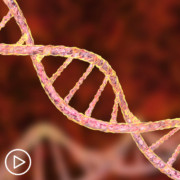
What Are Essential Genetic Tests for Metastatic Breast Cancer Patients? |

|
Transcript:
Katherine:
Well, Dr. Gralow, what other factors should be taken into consideration with a treatment route?
Dr. Gralow:
I always like to think of the treatment decision as relying on three factors, and the first relates to the tumor factor, the cancer factor.
So, we talked a lot about the biology, the estrogen receptor, the HER2, the genomic profiling. So, that’s critical, but there are two other components that we need to really strongly consider when trying to devise the right treatment regimen. One of those is patient factors, and not just the patient’s genetics, but are they pre- or post-menopausal?
What is the age? Where are they in life? Are they young with young kids? Are they working, and is that an important priority for them? Are they older and with grandchildren, and they don’t need to work? What is it that would be critical? What are the patient’s priorities here, and what are their fears, what are the things they would – what would be really important as we plan a regimen? And so, the patient factors which would be patient priorities and where they are in life right now.
And then, there’s factors related to the treatment itself, which would include not just how effective it is, but – and, this is really important when trying to decide regimens – what are the side effects of a regimen? For some patients, hair loss is a big deal, and we can put it off as long as possible – maybe choosing the first couple regimens don’t cause hair loss sometimes.
But, for other people, that doesn’t matter to them. For some, we have oral – some regimens, and that could keep them out of the infusion room, and others actually – I’ve had patients who actually like coming into the infusion room regularly so that they can review the side effects and get the reassurance provided by it. So, we’ve got different route of administration of the drugs, different side effects. If you already had, for example, a neuropathy – a numbness/tingling of fingers and toes – from treatment that you might have gotten for early-stage disease, we’d probably want to avoid drugs where that’s their major side effect in the metastatic setting and that would increase that even further.
We’ve got some drugs that cause a lot of toxicity to our GI system – nausea, vomiting, or diarrhea – and other drugs that don’t. And so, understanding what symptoms the patient already has and actually tailoring the treatment based on some of the side effects of the drug could also be done, as well as how they’re administered. So, again, patient factors, tumor factors, and then, factors related to the treatment itself all come into play when we make decisions.
Katherine:
There have been so many advances in breast cancer research. What are you excited about in research right now?
Dr. Gralow:
Well, every single drug that’s been approved, every single new regimen that’s been approved in breast cancer is the direct result of clinical trials, and this is a major part of my career, is to help patients get access to clinical trials and run important clinical trials that could lead to new discoveries – is this regimen better? What’s the toxicity?
Because until we have a cure for breast cancer, we need to do better, and we need to research better treatment options. So, doing trials, having access to clinical trials where you can participate, help move the science forward is key.
I think where we’re moving with breast cancer is the more we’re understanding the patient and the tumor, the more we’re realizing every single breast cancer is different, actually, and whereas when I started my training 20-plus years ago, breast cancer was breast cancer – we weren’t even using HER2 yet, we were just learning how to use estrogen receptor, and we kind of treated everything the same – now, we’re subsetting, and subsetting, and subsetting. Even in triple negative breast cancer now, which is about 18-20% of breast cancer, we’re subsetting.
Does that triple negative breast cancer have PD-L1, which is associated with being able to get immunotherapy drugs? Does it express androgen receptor? Because sometimes, even a breast cancer that doesn’t have estrogen or progesterone receptor can express the androgen receptor, like prostate cancer, and we can use some prostate cancer drugs. So, even triple negative breast cancer we’re subsetting and subsetting, and could that triple negative breast cancer be associated with a BRCA1 or 2 mutation, and then we can use the PARP inhibitors?
So, I’m actually really excited about that we’re learning more and more, and subsetting, and not treating breast cancer as one size fits all, and if we can better tailor the treatments to the patient and the tumor, that we are going to get to the point where I can tell my patients yes, we can get cures in metastatic breast cancer.

